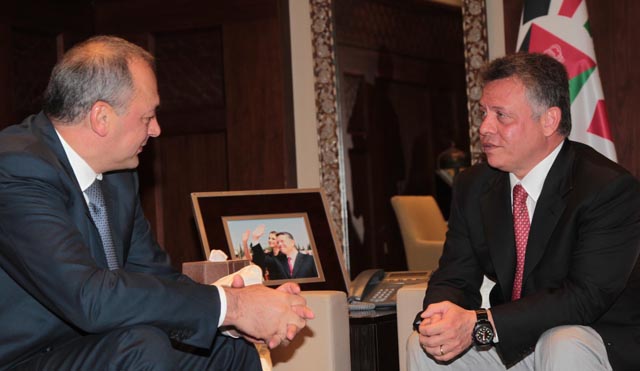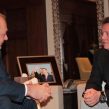
Moscow Develops Dagestan Along the Model of Chechnya
Publication: Eurasia Daily Monitor Volume: 9 Issue: 186
By:

Against the backdrop of a presumably pacified Chechnya, the neighboring republic of Dagestan remains only barely under the government’s control, even formally. In contrast to Chechnya, the Kremlin has stumbled in Dagestan and has been incapable of easing the tensions there as the intense armed confrontation between government forces and the militant armed underground grinds on.
A Chechen-style solution, with the Kremlin handing over full control of the republic to the local pro-Moscow elites, turning a blind eye to multiple breaches of the Russian law and providing financial resources, is not acceptable in Dagestan in principle. Yet it appears that Moscow has not been able to grasp this. Replicating the Chechen system of governance is precluded in all the North Caucasian republics except Ingushetia, where the political system is organized the same way as Chechnya’s. The head of Dagestan must deal with a myriad of ethnicities that historically have lived according to a clan system based on ethnic quotas and a division of business interests (www.svobodanews.ru/content/article/1930609.html). To break this structure would be the same as remolding the Swiss Confederation into a republic modeled on France’s political system.
In an attempt to fit Dagestan into a Chechen model, Russia decided to send the head of Dagestan, Magomedsalam Magomedov, into the international arena, as happened with Ramzan Kadyrov before. The Dagestani leader’s pivotal visit to Jordan, where he arrived on October 8, is evidence of this policy (https://mahachkala.bezformata.ru/listnews/provel-v-iordanii-ryad-vstrech/7056787/). Magomedov was to meet with the small Dagestani diaspora residing in Jordan. The choice of Jordan was not accidental: only several hundred Dagestanis live in Jordan, meaning unforeseen incidents are unlikely to occur. The citizens of the Hashemite Kingdom of Jordan, including ethnic Chechens, Circassians and Dagestanis, invariably welcome anyone who is approved of by the king. If the head of Dagestan really wanted to meet the huge Dagestani diaspora abroad, he would have chosen Turkey for the visit, where the Dagestani diaspora’s role is far greater than that of the Dagestani diaspora in Jordan (https://apsnyteka.narod2.ru/b/severokavkazskaya_diaspora_v_turtsii_sirii_i_iordanii_vtoraya_polovina_xix-pervaya_polovina_hh_veka/index.html). The propagandist nature of this visit was reflected in Magomedov’s statements. For example, speaking about Dagestan, the republican leader announced that the tunnel in Gymry had been opened, adding that “we would have never been able to do it without Russia” (www.riadagestan.ru/news/2012/10/9/143904/). Magomedov appeared to have nothing else to talk about apart from such a minor topic as the opening of a tunnel. All of Magomedov’s statements appeared to be designed to provide proof that Dagestan would perish without Russia and that everything positive that has been done in the republic was the result of Moscow’s favorable policies. Even when he answered questions about foreign students studying in Makhachkala, the head of Dagestan said that he would ask Moscow to resolve related issues.
The main purpose of Magomedov’s visit to Jordan was to get the support of its king to back Russian policy in the North Caucasus. Arguably, the trip, which was organized by the Russian Foreign Ministry, could not bypass the topic of Islamic radicalism. Speaking of the issue of Salafism, King Abdullah admitted: “We know firsthand what religious extremism is. We need to join efforts to fight it. In fact, we also have Salafism and Salafi extremism. Therefore, we need to have dialogue on the official level” (https://islam-today.ru/article/4795/). Out of King Abdullah’s comments, the Dagestani establishment extracted only the word “fight,” and this word made the headlines in Dagestan and Russia.
The next step in support of Moscow’s policies in Dagestan will be a massive conference of Islamic scholars from the Middle East who have a favorable attitude toward Russia. The gathering is designed to be a balancing tool against US influence in the region (https://islam-wasatiya.ru/index.php?id=52). A similar conference took place in Moscow and Grozny last summer (https://www.youtube.com/watch?v=ywiRxawLCns). That conference was supposed to have condemned Salafism but, to Moscow’s great dismay, the participants did not include that point in the conference’s final resolution (www.kavkaz-uzel.ru/articles/207900/?print=true). This time, the Kremlin hopes to bring together the type of Islamic scholars who would be bold enough to adopt a resolution condemning Salafism.
Following the successful completion of this plan, Moscow will provide financial injections to the local government under the guise of developing tourism (www.itar-tass.com/c183/498551.html). However, in the absence of superb leadership qualities on the part of Magomedsalam Magomedov, who acts more and more like a collective leader of the Dargin people, this plan will have negative consequences. The issue of how federal funds are distributed will result in a confrontation between the Avar majority and other Dagestani ethnicities, on one side, and the Dargin leadership of the republic, on the other.
Another aspect of this policy is the creation of local paramilitary units in Dagestan modeled along the lines of the Chechen battalions (www.politjournal.ru/index.php?action=News&tek=7182). Furthermore, in order to have forces under their command and outside federal control, the president of Dagestan proposed recreating civilian militias in Dagestani towns (https://moidagestan.ru/news/society/21407). The officials have been thinking about how to arm these militias without breaking Russian laws (www.ridus.ru/news/45076/).
It has become impossible to conceal the massive participation of the Russian military in special operations against the militants, and Moscow has admitted that the Russian army will take part in special operations in the North Caucasus (https://grani.ru/War/m.207141.html). It is no longer feasible to pretend not to hear or see military jets bombing the presumed locations of militants or to frame multiple movements of tanks and APCs as police operations.
Thus, the situation in Dagestan is developing according to the Chechen scenario, but with a time lag of five to seven years. If Moscow could achieve the same result in Dagestan as it did in Chechnya, the Russian leadership would consider the problem of the armed resistance to be resolved. However, the chances for such an outcome in Dagestan are zero. Moscow needs to engage the armed opposition through talks to find a solution to the problem, but this will be seen as Russian weakness. Moscow should continue the dialogue at least with the non-militant Salafis. Under any scenario, Russia slowly, but surely, is losing its hold on the region, and Jordan will not help it.




